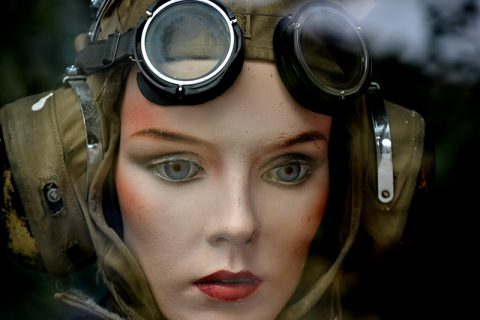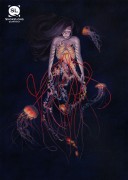How would you describe this piece? Is this is a successful tangent, improvisation, skaz—or did you have something more concrete in mind when you began? Can you elaborate a bit upon the evolution of this piece?
The night before I wrote this story, my husband and I attended a reading during which the authors debated the necessity of a day job, the value of an MFA, and how to balance writing and family—all things I think (worry) about often. Do I want to teach writing and live in a farmhouse? Stay in Boston and keep the job I love? Apply for an MFA? Open a small antique store? Join the circus? I often wish I had the foresight to choose the “right” path with the assurance that it will make me happy.
The next morning, I was writing about all this, bemoaning my lack of clarity, and I began a story about a woman who was magically blessed with the knowledge of where her choices would lead her. “Foresight” more or less emerged in one sitting, but it was overwritten. I wanted it to be lucid and stark—like the paths opening before the woman—so the style evolved as I pared it down to essentials.
Studies suggest that a great deal of daily thought is directed towards potential future events. Do you think gut feeling and intuition matter in strategic foresight? Is there a sixth or seventh sense?
It doesn’t surprise me to hear that people spend a lot of time thinking about the future—I certainly do! I’m trying to be better about appreciating where I am right now. It helps to remember that I based many of my big life decisions more on gut instinct than carefully laid plans—probably in spite of myself. The woman in the story doesn’t trust instinct; she’d rather know what’s ahead before she acts. Since in real life, you obviously can’t do that, I think waiting for assurance that a choice is “right” can be extremely limiting.
Maybe that “seventh sense” is a combination of foresight and gut feeling—gutsight?—where working toward a goal can lead to an open door you never knew existed. Since there’s no way to know if happiness lies on the other side, you have to rely on instinct to walk through. It’s like that Steve Jobs quote: “You can’t connect the dots looking forward; you can only connect them looking backwards. So you have to trust that the dots will somehow connect in your future.”
Can you expound on the importance of completing first drafts before editing and what Stephen King refers to as the need to “write with the door closed, rewrite with the door open,” via never showing rough opening chapters to anybody?
That’s what I’ve found works for me. When I first start a project, I’m excited about what’s there—but nervous about what isn’t there yet. (Notice a theme?) At this point, I’m tempted to explain the idea to someone—usually my husband—and ask for assurance that the story is heading in an interesting direction. Acting on this impulse has always backfired. Since the story hasn’t taken shape yet, I muddle the explanation and end up discouraged. So I decided never to talk about a draft until a critique partner has actually read it. That way, he/she is responding to what’s on the page, instead of my inarticulate sketch of the concept. I like to be confident in what I’ve written before I ask others to tear it apart.
Is the podium man a metaphor or is there anybody who inspired this story? Are there any symbols we should see in hindsight after reading this piece?
I did attend an author reading the night before writing the story, which is where the podium came from. Otherwise, I wonder whether you think the man is a metaphor, and if you read any symbols into the story. Maybe like Yeats, I magically manipulate my readers through symbols. If that were the case, I wouldn’t tell you!
In an Interview with Writer’s Digest, you emphasized the intrinsic value of making friends within the community. Is there any point where networking or being in a group can cease to be helpful or uplifting and might hinder the actual process of writing? Who are some authors whose work you admire?
My writing friends challenge me and make me a better writer; maybe even more importantly, I learn by critiquing their work. We also encourage one another. It can be difficult to finish drafting a project, much less stick with it through revision and submission and rejection, so it’s invaluable to have friends who can relate to the ups and downs of the writing process. To your point about whether networking can hinder writing: Like we discussed earlier, I think it’s about choosing readers carefully and then bringing them in at the right time, when input will be most helpful.
There are so many authors I admire. To name just a few of the authors who excited me so much I read all their books: Joan Didion, W. Somerset Maugham, Karen Russell, Evelyn Waugh, María Luisa Bombal, Truman Capote, Stephen King, Jane Austen. Specific books that continue to haunt me: Lolita, The Dark is Rising series, Geek Love, The Magus, In Cold Blood, Swamplandia!, Ulysses, House of Mist, Say Her Name.
The last author I wrote to, whose work I admire: Gillian Rubinstein, author of Galax-Arena, a 1995 sci-fi novel about three kids who are kidnapped to perform in a circus for aliens. I’d read this book in the nineties, and I picked it up again recently only to find that it was just as weird and beautiful and mysterious as I remembered. Why not write to those whose work touches you?



 The core workshop of SmokeLong Fitness is all in writing, so you can take part from anywhere at anytime. We are excited about creating a supportive, consistent and structured environment for flash writers to work on their craft in a community. We are thrilled and proud to say that our workshop participants have won, placed, or been listed in every major flash competition. Community works.
The core workshop of SmokeLong Fitness is all in writing, so you can take part from anywhere at anytime. We are excited about creating a supportive, consistent and structured environment for flash writers to work on their craft in a community. We are thrilled and proud to say that our workshop participants have won, placed, or been listed in every major flash competition. Community works.